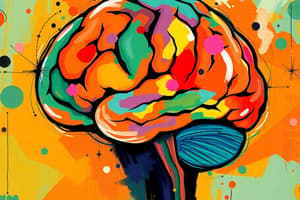Podcast
Questions and Answers
What does confusion represent in the context of learning?
What does confusion represent in the context of learning?
The first step to knowledge.
What is vital for success in school, work, and life?
What is vital for success in school, work, and life?
- Technical skills
- The ability to understand and get along with people (correct)
- Financial resources
- Academic talent
What is emotional intelligence (EI)?
What is emotional intelligence (EI)?
The ability to identify, use, understand, and manage emotions.
What do experts agree about emotions?
What do experts agree about emotions?
What are the two general abilities of emotional intelligence?
What are the two general abilities of emotional intelligence?
Which of the following skills is part of the Bar-On model of emotional intelligence?
Which of the following skills is part of the Bar-On model of emotional intelligence?
What is one factor that can improve performance according to the Bar-On model?
What is one factor that can improve performance according to the Bar-On model?
What types of skills influence a person's ability to cope with life’s pressures?
What types of skills influence a person's ability to cope with life’s pressures?
What is stress tolerance?
What is stress tolerance?
How do emotions affect success according to studies?
How do emotions affect success according to studies?
Flashcards are hidden until you start studying
Study Notes
Confusion and Knowledge
- Confusion is an initial step towards gaining knowledge.
Success Factors
- Understanding and getting along with others is essential for success across academic, work, and life contexts.
- Time management is a critical skill for success, enabling task completion and reducing stress.
Emotional Intelligence (EI)
- Emotional intelligence involves recognizing and managing one's own emotions and those of others, impacting academic persistence in college.
- Development of EI leads to improved self-awareness and understanding of emotional responses to situations.
Behaviors of Successful Students
- While challenges in life may be uncontrollable, the ability to adapt and respond positively is a trait among successful college students.
Definition and Importance of EI
- Emotional intelligence is the ability to identify, utilize, understand, and manage emotions, which plays a pivotal role in how individuals respond to various situations.
- Recognizing emotions can provide valuable information to enhance decision-making and problem-solving skills.
Domain of Emotional Intelligence
- Experts agree that emotions can be managed and improved, affecting overall success.
- EI encompasses abilities such as understanding and managing emotions.
Components of EI
- Understanding emotions involves accurately identifying feelings and their causes, as well as predicting the feelings of others.
- Managing emotions involves learning to harness feelings positively or disengage when necessary to avoid negative behaviors.
Emotional Awareness
- Understanding emotional states can help in adopting the right mood for different situations.
- Awareness enables effective coping with life's pressures, enhancing problem-solving and creativity.
Assessing EI
- Various tools, like the EQ-i (Emotional Quotient Inventory), provide detailed assessments of emotional skills and comparison with peers.
EI Competencies
- Bar-On's model identifies essential emotional intelligence skills: intrapersonal, interpersonal, stress management, and adaptability, leading to a positive general mood and performance.
Intrapersonal Skills
- Intrapersonal skills involve self-awareness, assertiveness, independence, self-regard, and self-actualization to maintain personal happiness.
- Self-knowledge is critical for understanding others and maintaining healthy relationships.
Interpersonal Skills
- Empathy, social responsibility, and nurturing interpersonal relationships are essential for developing a supportive network and overall happiness.
Adaptability
- Competencies like reality testing, flexibility, and problem-solving enable individuals to adjust effectively to changes and challenges.
Stress Management
- Skills crucial for managing stress include recognizing triggers and maintaining impulse control to ensure long-term success through careful decision-making.
Mood and Performance
- A positive outlook, characterized by optimism and happiness, significantly correlates with academic and life success.
Emotions' Role in Success
- Strong emotional intelligence ties closely to well-being and mental resilience, influencing longevity and overall life satisfaction.
- Studies indicate that emotionally intelligent students excel academically, demonstrating higher GPAs than peers with lower EI.
Emotional Management and Academics
- The inability to manage emotions negatively impacts academic performance, highlighting the importance of EI in educational settings.
Studying That Suits You
Use AI to generate personalized quizzes and flashcards to suit your learning preferences.




